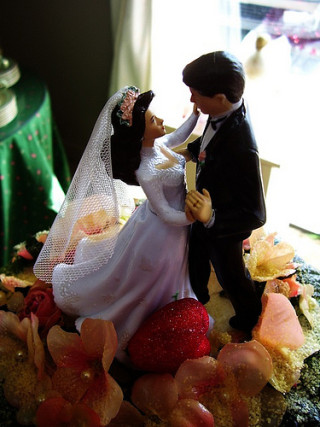
When should you give up on your marriage?How about never?Photo by: Clyde Robinson
Consider:
I run an atheist, egoist, anarchist church devoted to the lifelong adoration of one’s own life.
I champion complete chastity before marriage and exclusive fidelity thereafter – all in pursuit of the very best love any human being can make: Storgic love, the enduring love of families.
I insist that the essential component in every succeeding family is the father, that it is his steady hand that cultivates self-responsible adulthood in his children, that his absence is the source of every social chaos, and that Western Civilization will only be redeemed when fatherhood is reestablished in its inescapable preeminent leadership role in the family.
There’s more, tons of it. I am an iconoclast on everything – not for the sake of self-induced iconoclasms, but simply because everything I see is upside down. Indeed, I believe I can summarize my entire life in seven simple words:
If I’m not crazy, everyone else is.
Another man might rebel against those possibilities, but I figure I win either way: I don’t hate being wrong. Discovering and correcting my own errors is how I learn best. But I do hate being dependent on other people – and I think all-but-all-of-them are ass-backwards in their thinking anyway.
All of which makes me immensely popular – with no one. I know how to be happy all the time, and no one else does. I know how to make make marriage an endless ecstasy, and no one else does. I know how to fix everything, and – obviously – no one else does. In a non-ass-backwards world, my particular brand of magic beans would be doing a land-office business. But this is not so in our current environs.
So: Let’s stretch out even more iconoclasticity by taking away yet another scared dogma of modernity, the idea of divorce as a value.
David Brodie asked a couple of questions about the idea of “working at” your marriage: When do I give up on my marriage? And how do I know if I should?
You could take this up with 999 people and get essentially identical answers from all of them.
And then you would come to me.
My first answer: Stop shopping. If you’re not both mutually, exclusively and explicitly committed to each other, you don’t yet have a marriage to abandon. You’re renting, not owning.
But what about when you do resolve to make that commitment? I think that to see marriage as anything other than forever is a mistake. Drowning is a poor swimming strategy, and divorce turns out to be an awful way to stay married. Even to entertain the possibility is to invite it.
Conversely, if both of you are always focused on making your marriage work, despite how much it sometimes seems not to want to work, you will work things out in due course.
Why not just trade up instead? Because you can’t. The time of your life is non-fungible, as are the experiences you have shared with your spouse. Whatever happens later can never replace what came before. This is true for everything, but romantic storgic love is a balloon that grows weaker each time you blow it up. Trimming the outliers – verbal and physical abuse – there is nothing you will get by shopping that will be better than what you already have.
So what should you do? Respond accordingly, as best you can, from where you are now.
More at this week’s Church of Splendor homily, including a philosophical dissection of the plot of every romantic comedy – tying it back to this idea of romantic storgic unbreakable marriage:















